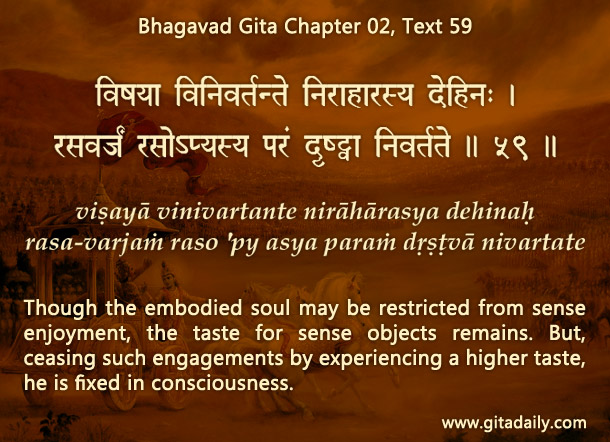
A bird may be physically restrained by a cage, but it can’t be mentally restrained from dreaming and craving about the grains it could have been feasting on in the field.
The bird can’t be blamed for its sensual preoccupation because subhuman beings such as birds don’t have the developed consciousness to seek any purpose of existence higher than pandering to the bodily demands of eating, sleeping, mating and defending. We humans do have that evolved consciousness, but we need to exercise it for perceiving and pursuing a higher purpose. Otherwise, our higher potential remains unutilized and we remain restricted to the same stereotyped activities that drive lower beings.
To help us unleash our higher potential, wisdom-traditions such as the Gita wisdom-tradition enjoin dos and don’ts: do spiritual processes such as meditation that help fix our mind on higher realities; and don’t indulge indiscriminately in worldly pleasures that keep our consciousness fettered to matter. Unfortunately, many people don’t know about the positive purpose of scriptural injunctions, so they don’t follow the dos diligently.
Reflecting the predicament of those who struggle to follow only the don’ts, the Bhagavad-gita (02.59) indicates that despite the outer restraints, the inner desire remains – the senses resent the regulation, protesting as if it were deprivation of a necessity (niraharasya).
Gita wisdom educates us about life’s spiritual purpose. This education inspires us to focus on the scriptural dos and fix the mind on a higher spiritual reality, preferably on the highest spiritual reality, Krishna. The resulting non-material satisfaction makes us peaceful (parama dristhva nivartate), for we realize that regulation is not deprivation. Gradually, as we become habituated to rejoicing in devotional fulfillment, we experience that the material regulation has facilitated our spiritual liberation into an eternal life of love with Krishna.


The absence of unhappiness does not necessarily imply happiness. The active experience of happiness naturally overrides unhappiness. Lower taste is automatically transcended by higher taste. ‘Do-not’ is defensive and stagnates while ‘do’ is assertive and always on the move. We always want to pursue the endeavor to move towards the source of all happiness: Lord Sri Krishna.
Hare Krishna ,
Very helpful article Prabhuji ,Thank you.
Another drop of nectar!
Thank you for sharing the wisdom.
Hare Krsna!